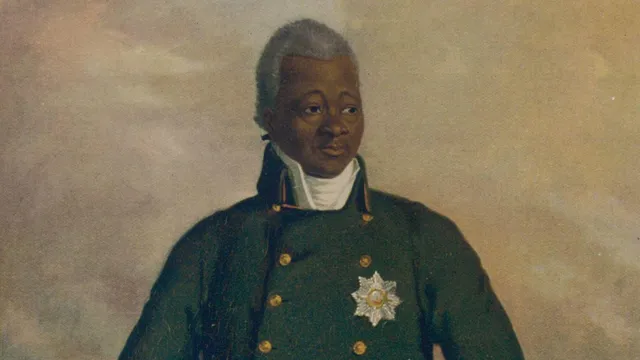
Henry Christophe crowned as king of Haiti in historic ceremony
2025-03-07 17:00- On June 2, 1811, Henry Christophe was crowned king during a lavish ceremony in Cap-Henry, Haiti.
- The coronation symbolized a transition from colonial oppression to self-governance for the Haitian people.
- Henry Christophe's reign was aimed at establishing stability and national pride in post-colonial Haiti.
Express your sentiment!
Insights
On June 2, 1811, a significant event took place in Haiti when Henry Christophe was crowned as king in a grand ceremony. This event occurred in Cap-Henry, where he and his wife, Marie-Louise, were seen riding through the city in a luxurious carriage pulled by eight horses. The vibrant atmosphere of the day was underscored by the presence of illustrious decorations, including a church specifically constructed for this occasion. The crowning ceremony featured a 70-foot-tall throne and grand tapestries that displayed the king's coat of arms, which included symbols of two crowned lions and a phoenix, representing rebirth and renewal with the motto “I am reborn from the ashes”. This event marked a pivotal moment in Haitian history, as Henry Christophe was not just a leader but a son of a former slave who had played a fundamental role in the Haitian Revolution. The revolution itself aimed at achieving freedom and independence from colonial rule, and the coronation of Christophe as king illustrated a transition from colonial oppression to self-governance. He positioned himself as a protector of the newly formed nation, aiming to destroy tyranny and promote regeneration for his people. The formal edict that announced Christophe as king emphasized his self-proclaimed titles, including being the “destroyer of tyranny” and a “benefactor” to his people. The crowning ceremony was a symbolic representation of Haiti's autonomy and collective identity that emerged following the successful revolution against French rule. In a society that had endured years of slavery, Christophe's ascension to the throne was meant to inspire hope and a renewed sense of purpose among the Haitian population. Christophe's reign was characterized by a desire to stabilize and develop the nation in the aftermath of independence. His rule was often marked by a mix of authoritarianism and an effort to maintain national pride, but it also encapsulated the complexities of governance in a post-colonial context. Ultimately, this historic event not only marked the beginning of his monarchy but also had lasting implications on the fabric of Haitian society.
Contexts
The Haitian Revolution, a profound episode in the history of the Americas, unfolded between 1791 and 1804 and resulted in the establishment of Haiti as the first independent Black republic and the first nation to abolish slavery. The revolution was fueled by the growing discontent among enslaved people, driven by the ideals of liberty and equality propagated by the Enlightenment and the American and French revolutions. The harsh conditions endured by enslaved Africans on sugar plantations in Saint-Domingue, coupled with the incitement to revolt by leaders such as Toussaint Louverture, Jean-Jacques Dessalines, and Henri Christophe, set the stage for a formidable uprising. This rebellion was marked by violent confrontations, strategic alliances, and the eventual expulsion of colonial powers from the island, primarily the French, who sought to maintain their economic interests in the lucrative sugar production of the region. The revolution had a unique character due to its successful challenge against colonialism and slavery. While other nations grappled with democratic ideals, Haiti's struggle was intrinsically linked to the abolition of slavery. Toussaint Louverture emerged as a significant figure, displaying remarkable military and political acumen, which allowed him to lead a diverse coalition of formerly enslaved people and free Blacks against colonial forces. He initially aligned himself with the French revolutionary government, expecting it to uphold the rights of the colonies; however, when Napoleon sought to reestablish slavery in the colonies, Louverture's loyalty shifted, leading to his arrest and deportation to France. The war for independence continued under the leadership of Dessalines, who ultimately declared Haiti's independence on January 1, 1804. This momentous occasion marked a turning point in global history, symbolizing the triumph of a colonized people over their oppressors. The Haitian Revolution not only abolished slavery but also inspired other movements in Latin America and beyond, illustrating the possibility of freedom for oppressed peoples. It sent shockwaves throughout the slave-holding world, instigating fears of slave revolts and leading to a reconsideration of colonial policies in several nations. Following independence, Haiti faced numerous challenges, including international isolation, economic instability, and political strife, stemming largely from the refusal of major powers to recognize its sovereignty. The nation was forced to pay reparations to France, crippling its economy for decades. Despite these hardships, the legacy of the Haitian Revolution remains profound, as it provided a model of resistance against oppression and reshaped discussions of race, freedom, and rights in the Americas. It echoes through modern struggles for justice and equality, making the Haitian Revolution a pivotal chapter in the broader narrative of human rights and liberation movements worldwide.